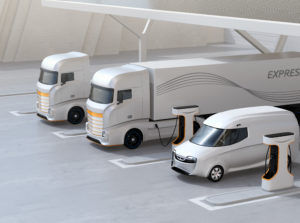Environmental protection is playing an increasingly important role for the EU. Through EV subsidies and tax exemptions, the countries intend to convince car drivers and company fleets to switch to electromobility asap. We show how this has worked so far and what 6 European countries offer the best EV incentives.
There are now government subsidies for electric cars in almost all EU countries. The 4 EV main incentives include:
- Tax breaks on registration
- Vehicle tax reductions for private car owners
- Tax reductions for company cars
- Purchase incentives
These vary significantly between countries in terms of type and amount. However, the EV subsidies are all aiming at both private users and drivers of company cars. After all, company cars or professional fleets account for the majority of car sales in the European market.
Find out what benefits you can look forward to as an EV driver or manager of an EV fleet in our overview of the 6 best EU countries for EV subsidies:
EV incentives in Norway
Here is an overview of the electric vehicle incentives in Norway.
EV subsidies
- Counties and municipalities may only charge 50% of the fees that apply to owners of fossil fuel cars on ferries, toll roads or public parking lots
- In some areas, these fees are dropped completely for EV drivers
Tax benefits
- No import taxes
- No purchase tax and VAT on the purchase of EVs
- No purchase taxes
- Exemption from Norway’s 25% value-added tax
Charger incentives
- Funding of EV charging points every 50 km on major roads
- Funding for housing associations to install EV charging stations in the amount of €2.1m
- Replacement of gas pumps with charging stations at some local gas stations
EV incentives in Germany
Here is an overview of the electric vehicle incentives in Germany.
EV subsidies
- €9.000 for a purchase price up to €40.000
- €7.500 for a purchase price up to €65.000
- One-time subsidy of up to 50% of the investment costs of EVs for commercial use
Tax benefits
- Vehicle tax exemption for up to 10 years for buyers of EVs between 2011 and 2030
- Since 2019: concession on the charge of normally 1% to the imputed income tax for drivers who also use the company car for private purposes:
- EVs with sales price below €60.000 are taxed at only 0.25%
- EVs with sales price below €60.000 are taxed at only 0.25%
Charger incentives
- Some banks offer EV incentives of 10–30% for the installation of wallbox charger
- Grant of €3.000 for the installation of public charging stations up to 22 kW
- Grant of €12.000 for installation of DC chargers up to 100 kW
- Grant of €30.000 for the installation of DC chargers over 100 kW
- Up to €5.000 grant for the installation of low-voltage connections and up to €50.000 for medium-voltage connections
EV incentives in France
Here is an overview of the electric vehicle incentives in France.
EV subsidies
- Allowance for EVs with CO2 emissions of 20 g/km or less:
- €6.000 for households, vehicle price below €45.000
- €4.000 for legal entities vehicle price below €45.000
- €2.000 for households and legal entities, vehicle price between €45.000 and €60.000 or for vans above €60.000
- Scrapping bonus for the purchase of used or new cars with CO2 emissions below 50 g CO2/km:
- Passenger cars: up to €5.000 (depending on income)
- Transporter: up to €9.000 (depending on weight)
- Conversion bonus:
- €5.000 for purchase of new or used EVs, condition: diesel vehicle is older than 2001 or gasoline vehicle older than 1997
- Low emission zone bonus of €1.000 if EV owner lives or works in a low emission zone
Tax benefits
- 50% discount or complete exemption from registration tax (depending on location)
- Exemption from emission tax for vehicles with less than 60 g CO2/km
- Full exemption from company car tax
Charger incentives
- €300 tax credit for private households that purchase and install a charging point
- 50% of the purchase and installation costs of a charging point on condominiums or apartment buildings
- 40% (max. €2.160) of the purchase and installation costs of a charging point in a municipality
- 40% of the purchase and installation costs of charging points are reimbursed to companies
EV incentives in the UK
Here is an overview of the electric vehicle incentives in the United Kingdom.
EV subsidies
Purchase grant (Plug-in Car Grant):
- 35% reimbursement for the purchase of an EV (max. £2.500)
- 20% reimbursement for the purchase of an electric van (max. of £20.000 for the first 200 orders, then max. £8.000)
Tax benefits
- Exemption from annual vehicle tax (also known as road tax) until April 2025 (for EVs under £40.000 purchase price)
- Possible reduction on the benefit tax rate
- Companies can offset the entire purchase price against corporate tax liability if CO2 emissions of less than 50 g/km
Charger incentives
EV charger grant for homes:
- Electric Vehicle Homecharge Scheme (EVHS): EV buyers are reimbursed 75% (max. £350, VAT included) of the purchase and installation costs of a charging point
EV charger grant for workplaces:
- Businesses receive vouchers that cover the purchase and installation costs upfront:
- After 01.04.2020: 75% of purchase and installation costs reimbursed (max. £350 per outlet for max. 40 outlets at all sites)
- 75% of purchase and installation costs reimbursed (max. £500 per outlet for max. 20 outlets at all locations)
EV incentives in Spain
Here is an overview of the electric vehicle incentives in Spain.
EV subsidies
MOVES II:
- Passenger cars (up to €45.000):
- €1.900 subsidy at a range of 30–90km (up to €2.600 with scrapping of old vehicle)
- €4.000 subsidy at a range of +90km (up to €5.500 with scrapping of old vehicle)
- eLCVs (up to 3,5t):
- €4.400 subsidy at a range of +30km (up to €6.000 with scrapping of old vehicle)
MOVES III (until 2023):
- €4.500 bonus for EV buyers without scrapping the old vehicle
- €7.000 bonus for EV buyers with scrapping of old vehicle
Tax benefits
- Exemption from special tax for EVs with CO2 emissions of less than 110 g CO2/km
- Vehicle tax:
- Reduction of 75% on the purchase of an EV for private persons
- Taxation as imputed income for companies, but with a reduction of 30% for EVs below €40.000
Charger incentives
- 30–40% (max. €100.000) of the acquisition and installation costs of charging stations for private individuals and companies reimbursed
EV incentives in Italy
Here is an overview of the electric vehicle incentives in Italy.
EV subsidies as of 2023
- €4.500 bonus for EV buyers (€7.500 with scrapping of old vehicle)
- €3.000 bonus for EVs over €30.000 (€5.000 with scrapping of old vehicle)
Tax benefits
- Vehicle tax exemption for 5 years, then a 75% reduction for EVs
Charger incentives
- Private persons and companies can deduct 50% of the acquisition and installation costs of charging points from their taxes (max. €3.000, spread over 10 equal annual installments)
Puh, that was quite some input and numbers. Nevertheless, we hope we have brought light into the EV incentive- and subsidies universe. As a company with a fleet, optimal usage of incentives and subsidies is key to optimizing your cost structure, especially when facing the challenges of (fleet-) electrification. Our strategic electrification planner within PANION Transition may also help you find the best EVs for your fleet taking subsidies into account. Combined with PANION Charging solutions, you can also optimize your charging operations and stay ahead of the game in challenging times like these.




